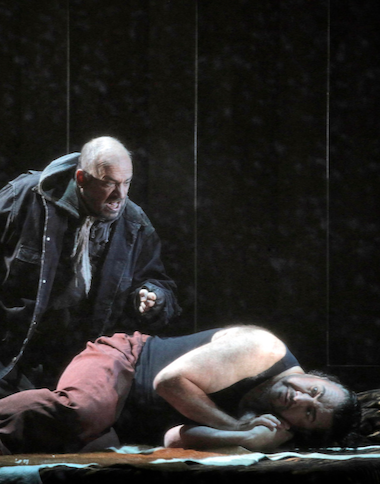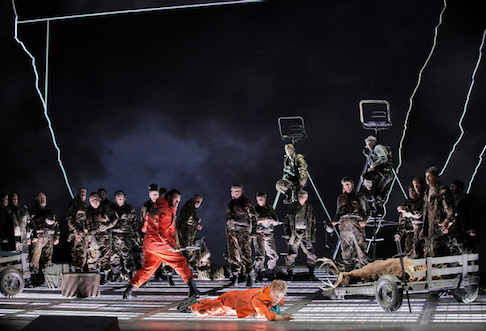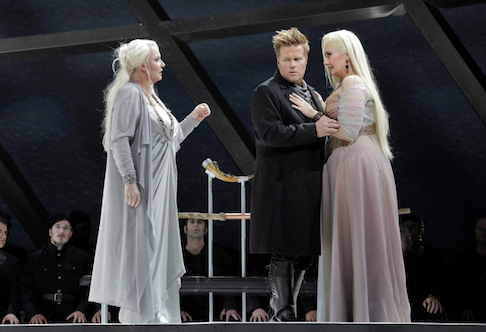Recently in Reviews
English Touring Opera are delighted to announce a season of lyric monodramas to tour nationally from October to December. The season features music for solo singer and piano by Argento, Britten, Tippett and Shostakovich with a bold and inventive approach to making opera during social distancing.
This tenth of ten Live from London concerts was in fact a recorded live performance from California. It was no less enjoyable for that, and it was also uplifting to learn that this wasn’t in fact the ‘last’ LfL event that we will be able to enjoy, courtesy of VOCES8 and their fellow vocal ensembles (more below …).
Ever since Wigmore Hall announced their superb series of autumn concerts, all streamed live and available free of charge, I’d been looking forward to this song recital by Ian Bostridge and Imogen Cooper.
The Sixteen continues its exploration of Henry Purcell’s Welcome Songs for Charles II. As with Robert King’s pioneering Purcell series begun over thirty years ago for Hyperion, Harry Christophers is recording two Welcome Songs per disc.
Although Stile Antico’s programme article for their Live from London recital introduced their selection from the many treasures of the English Renaissance in the context of the theological debates and upheavals of the Tudor and Elizabethan years, their performance was more evocative of private chamber music than of public liturgy.
In February this year, Albanian soprano Ermonela Jaho made a highly lauded debut recital at Wigmore Hall - a concert which both celebrated Opera Rara’s 50th anniversary and honoured the career of the Italian soprano Rosina Storchio (1872-1945), the star of verismo who created the title roles in Leoncavallo’s La bohème and Zazà, Mascagni’s Lodoletta and Puccini’s Madama Butterfly.
Evidently, face masks don’t stifle appreciative “Bravo!”s. And, reducing audience numbers doesn’t lower the volume of such acclamations. For, the audience at Wigmore Hall gave soprano Elizabeth Llewellyn and pianist Simon Lepper a greatly deserved warm reception and hearty response following this lunchtime recital of late-Romantic song.
Collapsology. Or, perhaps we should use the French word ‘Collapsologie’ because this is a transdisciplinary idea pretty much advocated by a series of French theorists - and apparently, mostly French theorists. It in essence focuses on the imminent collapse of modern society and all its layers - a series of escalating crises on a global scale: environmental, economic, geopolitical, governmental; the list is extensive.
For this week’s Live from London vocal recital we moved from the home of VOCES8, St Anne and St Agnes in the City of London, to Kings Place, where The Sixteen - who have been associate artists at the venue for some time - presented a programme of music and words bound together by the theme of ‘reflection’.
'Such is your divine Disposation that both you excellently understand, and royally entertaine the Exercise of Musicke.’
Amongst an avalanche of new Mahler recordings appearing at the moment (Das Lied von der Erde seems to be the most favoured, with three) this 1991 Mahler Second from the 2nd Kassel MahlerFest is one of the more interesting releases.
‘And there was war in heaven: Michael and his angels fought against the dragon; and the dragon fought and his angels, And prevailed not; neither was their place found any more in heaven … that old serpent … Satan, which deceiveth the whole world: he was cast out into the earth, and his angels were cast out with him.’
If there is one myth, it seems believed by some people today, that probably needs shattering it is that post-war recordings or performances of Wagner operas were always of exceptional quality. This 1949 Hamburg Tristan und Isolde is one of those recordings - though quite who is to blame for its many problems takes quite some unearthing.
There was never any doubt that the fifth of the twelve Met Stars Live in Concert broadcasts was going to be a palpably intense and vivid event, as well as a musically stunning and theatrically enervating experience.
‘Love’ was the theme for this Live from London performance by Apollo5. Given the complexity and diversity of that human emotion, and Apollo5’s reputation for versatility and diverse repertoire, ranging from Renaissance choral music to jazz, from contemporary classical works to popular song, it was no surprise that their programme spanned 500 years and several musical styles.
The Academy of St Martin in the Fields have titled their autumn series of eight concerts - which are taking place at 5pm and 7.30pm on two Saturdays each month at their home venue in Trafalgar Square, and being filmed for streaming the following Thursday - ‘re:connect’.
The London Symphony Orchestra opened their Autumn 2020 season with a homage to Oliver Knussen, who died at the age of 66 in July 2018. The programme traced a national musical lineage through the twentieth century, from Britten to Knussen, on to Mark-Anthony Turnage, and entwining the LSO and Rattle too.
With the Live from London digital vocal festival entering the second half of the series, the festival’s host, VOCES8, returned to their home at St Annes and St Agnes in the City of London to present a sequence of ‘Choral Dances’ - vocal music inspired by dance, embracing diverse genres from the Renaissance madrigal to swing jazz.
Just a few unison string wriggles from the opening of Mozart’s overture to Le nozze di Figaro are enough to make any opera-lover perch on the edge of their seat, in excited anticipation of the drama in music to come, so there could be no other curtain-raiser for this Gala Concert at the Royal Opera House, the latest instalment from ‘their House’ to ‘our houses’.
"Before the ending of the day, creator of all things, we pray that, with your accustomed mercy, you may watch over us."
Reviews

23 Jun 2018
Götterdämmerung in San Francisco
The truly tragic moments of this long history rich in humanity behind us we embark on the sordid tale of the Lord of the Gibichungs’s marriage to Brünnhilde and the cowardly murder of Siegfried, to arrive at some sort of conclusion where Brünnhilde sacrifices herself to somehow empower women. Or something.
The Zambello Ring is big, and particularly Götterdämmerung is huge. There is a lot of video — Wagner’s musical interludes are always fully illustrated. Some of this surprisingly successful video was newly created for this revival by S. Katy Tucker, earlier created videos were by Jan Hartley.
There is a lot of architecture — abandoned warehouse buildings of some post-industrial era, monumental civic structures, crumbling elevated cement roadways, there are tons of plastic bottles that litter a dried up river bed. In this re-mounting of the 2011 San Francisco Ring the sets designed by Michael Yeargan have become fully absorbed into the telling of the saga, and fully achieve Wagnerian Gesamtkunstwert where words and music are one with sight, an achievement to be savored as it is indeed rare.
The Donald Runnicles Ring is big, well exploiting the full resources of the eighty-nine players of the admirable San Francisco Opera Orchestra. Seated on the left side of the theater the magnitude of sound flowed gloriously across the expanse of the theater to fully absorb me into its myriad of leitmotivic detail and massive ensemble. The Wagnerian Rhine, its reality and its myth, was fully present in the Runnicles reading.
The signature image of the Götterdämmerung is the massive computer mother board and the three norns who plug and replug cables until one snaps in the famous orchestral clap and we enter the pitiful world of the Gibichungs (FYI fourth century Burgandians) whose leader is the unmarried Gunter, his sister Gutrune is also unmarried. Alberich’s son Hagen manipulates these two weak creatures into disastrous marriages to further his goal of becoming lord of the ring and possessor of the massive hoard of gold.
 Hagen kills Siegfried. The Ring production costume designer is Catherine Zuber.
Hagen kills Siegfried. The Ring production costume designer is Catherine Zuber.
San Francisco Opera’s house bass Andrea Silvestrelli sang Hagen. Mr. Silvestrelli’s extraordinary height plus his dark, rough and powerful voice gave a strong presence to this cunning personnage who cruelly orchestrates the marital disasters. Though you might wish for more elegance of sound and subtlety of character, Mr. Silverstrelli certainly did the job, playing the role to the hilt.
San Francisco Opera house baritone Brian Mulligan sang Gunter. Mr. Mulligan possesses a very beautiful, Italianate voice without supplying a persuasive presence. This worked for establishing a certain character for Gunter though you might have wished for a less lyric voice and a more forward personality. Mr. Mulligan did succeed in making Gunter pathetic, evoking my reluctant sympathies for such a weakness.
We first encountered mezzo soprano Jamie Barton as a contemptuous Fricka. In Götterdämmerung she sings Waltraute, Brünnhilde’s valkyrie sister who comes to Brünnhilde to beg her to return the ring to the Rhine, to break its curse and perhaps save the gods. It is our last reference to Wotan before his annihilation in the opera’s last moments. Unfortunately Mlle. Barton was unable to achieve the angst and the gravitas that might have moved Brünnhilde to save her father. The complexity of the pathos of this scene were lost in its pallid reading.
 Siegfried and his two brides. Gutrune (right) sung by Melissa Citro
Siegfried and his two brides. Gutrune (right) sung by Melissa Citro
Soprano Iréne Theorin perservered through it all. In firm Brünnhilde character she ferociously denounced her marriage to Gunter, and together with Hagan and Gunter she swore revenge on Siegfried, this spectacular marriage scene set in the monumental architecture of the Gibichung Hall. She remained in equal vocal radiance for her immolation. Tenor Daniel Brenna’s Siegfried perservered through it all to make, finally, his scene with the Rhine maidens one of the memorable moments of the entire Ring. Maestro Runnicles brought earth shattering pathos to Siegfried’s death, freezing for eternity the complex emotions of this climactic moment.
After much sublime poetry over sixteen or so hours of one of the finest Rings I have ever seen, the immolation of Brünnhilde and the gods of Valhalla was strangely prosaic. Inexplicably, or maybe as victimized sisters Gutrune, Siegfried’s wife, stood by Brünnhilde’s during the valkerie's invocation to the ravens (unseen) to fly to Valhalla. The female chorus joined the Rhine maidens and Gutrune on stage for Brünnhilde’s horseless immolation. The radiant calm of the Ring’s final music was captured by the Rhine maidens energetically swirling great swathes of gold cloth.
Michael Milenski
Cast and production information:
Brunnhilde: Irene Thorin; Siegfried: Daniel Brenna; Gunther: Brian Mulligan; Hagen: Andrea Silvestrelli; Waltraute: Jamie Barton; Gutrune: Melissa Citro; Alberich: Falk Struckmann; First Norn: Ronnita Miller; Second Norn: Jamie Barton; Third Norn: Sarah Cambidge; Woglinde: Stacey Tappan; Wellgunde: Lauren McNeese; Flosshilde: Renée Tatum. Chorus and orchestra of the San Francisco Opera. Conductor: Donald Runnicles; Production/Stage Director: Francesca Zambello; Associate Director: Laurie Feldman; Choreographer: Denni Sayers; Set Designer: Michael Yeargan; Costume Designer: Catherine Zuber; Lighting Designer: Mark McCullough; Projections: Jan Hartley. War Memorial Opera House, San Francisco, June 17, 2018..


